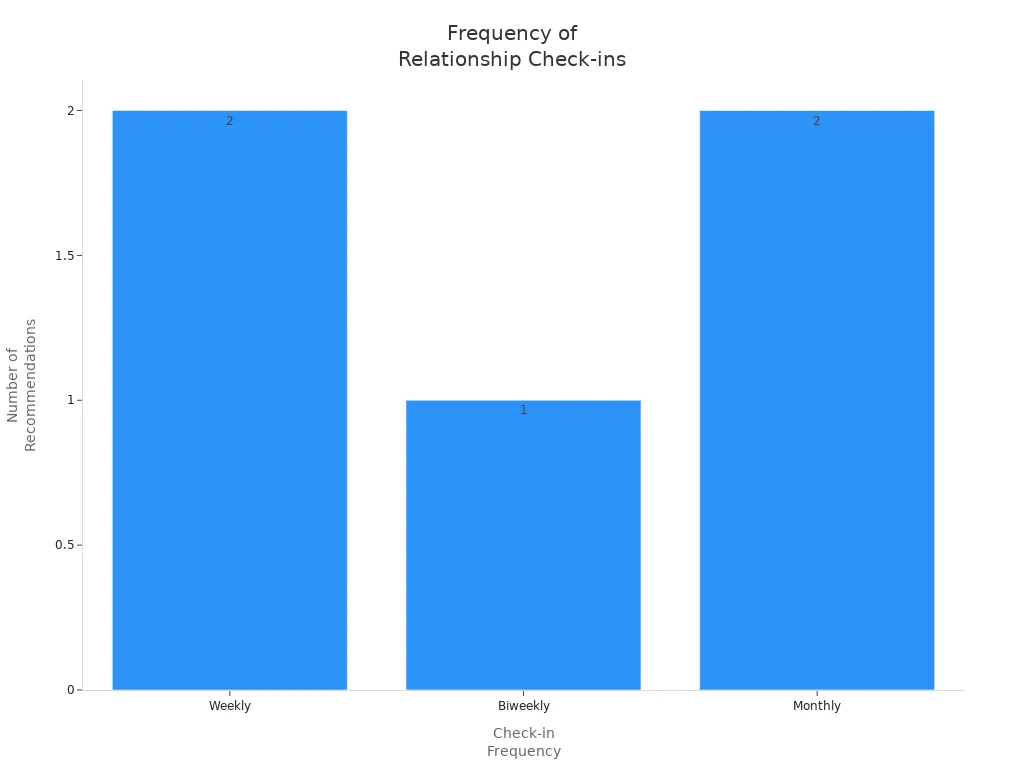How New Couples Can Communicate Boundaries with Confidence

Setting boundaries in new relationships helps you build trust. It also helps you build respect. Using boundary-setting scripts for new couples can help a lot. These scripts make it easier to talk about boundaries.
Emotional safety is important. You can use helpful tools, like the Gaslighting Check Tool. These tools can help your conversations. Healthy boundaries give your relationship a strong start.
Setting Healthy Boundaries

What Are Boundaries?
Boundaries are rules you make to keep yourself safe. They protect your feelings, space, and needs. When you start a new relationship, boundaries help you feel safe. They also help you feel respected. You choose what feels right for you. Boundaries can be about your time. They can be about your body. They can be about your emotions. If you do not set clear limits, you might have unhealthy boundaries. This can make you feel mixed up or worried.
Here are some common types of boundaries new couples set:
Expectations for the Future: You talk about your goals and plans. This helps you both know what you want.
Sexual Needs: You share what makes you feel safe and comfortable. This is important in close moments.
Family Involvement: You decide how much time you spend with each other's families.
Boundaries show what is okay and what is not okay in a relationship. This can be with friends, partners, co-workers, bosses, or family members. We use boundaries to protect ourselves. They help us build trust, safety, and respect.
Why Boundaries Matter
Setting healthy boundaries lets you control your life. You feel sure of yourself when you know your limits. If you do not set boundaries, you might have unhealthy ones. This can make you feel upset and confused. You might forget who you are or feel worried. Experts say unclear boundaries can make you feel angry and less happy.
Theory | Description |
|---|---|
You worry someone will leave you. This can make you act in unhealthy ways. | |
Attachment Theory | You learn how to connect with others. This starts when you are a child. |
Fear of Engulfment | You feel overwhelmed by too much attention. You might lose your sense of self. |
Setting healthy boundaries helps you avoid these problems. You build trust and respect with your partner. You also keep your feelings safe and make your relationship strong.
Boundary-Setting Scripts for New Couples
Setting boundaries can feel hard when you start a new relationship. You want to be honest, but you also want to be kind. Using boundary-setting scripts for new couples helps you say what you need. These scripts give you words to use when you talk about your feelings, your space, and your time. You can use them to make sure your partner understands you. When you use clear scripts, you build trust and respect.
Emotional Boundaries
Emotional boundaries help you protect your feelings. You need to know what makes you comfortable. You also need to know what makes you feel safe. Many new couples struggle to set emotional boundaries. You may feel pressure to take on your partner’s emotions or fix their problems. You may forget to put your own needs first.
Here are some common emotional boundaries:
Put your needs first.
Don’t take responsibility for their feelings.
Be clear about your time commitment.
Maintain your independence.
You can use boundary-setting scripts for new couples to talk about your emotional needs. Here are some examples:
“I don’t need you to fix anything. I just need you to listen to how I’m feeling right now.”
“My mental health is important to me. I choose to spend one hour every day on self-care.”
“It doesn’t feel good when you tell me what to believe. I understand your values, and I make choices based on my own values.”
“No, I’m saying that what you said hurt my feelings. I’m asking you not to say that to me anymore.”
Tip: Try using the DEAR MAN technique from Dialectical Behavior Therapy (DBT). This method helps you state your needs clearly and respectfully.
If you ever feel confused or unsure about your partner’s words, you can use the Gaslighting Check Tool. This tool helps you spot manipulation in your conversations. It gives you instant feedback and helps you trust your own feelings.
Physical Boundaries
Physical boundaries protect your body and your personal space. You decide what feels right for you. You may want to talk about how much physical affection you like. You may want to set rules about privacy or possessions.
Here are some boundary-setting scripts for new couples:
“I’m not ready to hold hands in public yet. I need more time.”
“Please ask before you borrow my things.”
“I need some space when I’m upset. I’ll let you know when I’m ready to talk.”
“I feel comfortable with hugs, but I’m not ready for more right now.”
Setting physical boundaries helps you feel safe. It also helps your partner know what you expect. If you notice your partner does not respect your boundaries, you can use the Gaslighting Check Tool. This tool helps you see if your partner uses manipulation or ignores your needs. You can use the insights to make decisions and keep your relationship healthy.
Time Boundaries
Time boundaries help you manage your schedule and your energy. You need time for yourself, your friends, and your family. You also need time with your partner. Setting time boundaries prevents burnout and resentment.
Here are some boundary-setting scripts for new couples:
“Thanks for the invite! I’m going to take it easy at home tonight.”
“I appreciate your perspective, but I’m comfortable with the choices I’ve made.”
“I need some time alone after work to recharge.”
Research shows that couples who set time boundaries feel happier. You can see this in the table below:
Evidence | Description |
|---|---|
Time Apart | Structured and intentional time apart with clear boundaries leads to better relationship satisfaction. |
Quality Interactions | Couples who engage in meaningful conversations during their time together report higher satisfaction. |
Setting and respecting time boundaries helps you avoid burnout. You also feel less resentment. You can use the Gaslighting Check Tool if you feel pressured to give up your time. The tool helps you spot manipulation and gives you confidence to stand by your boundaries.
Note: Boundaries are essential for self-care. They help you stay healthy and happy in your relationship.
Using boundary-setting scripts for new couples makes it easier to talk about your needs. You build trust, respect, and emotional safety. You also learn to recognize manipulation and protect yourself with tools like the Gaslighting Check Tool.
Starting the Conversation
Choosing the Right Moment
You want your talk about boundaries to go well. Picking a good time helps you feel listened to. Experts say you should talk when things are calm. Do not bring up hard topics during fights or stress. Use a soft voice and pick a safe place for both of you. Here are some tips for starting the talk:
Wait until you both feel calm.
Say if you are not ready to talk.
Start early, before problems get bigger.
You can use these ideas with family, too. Calm talks and honest words help people know your needs. Change the subject or leave politely if you feel uneasy. Ask questions back if someone wants to know things you do not want to share.
Tip: Setting boundaries with family works best when you stay calm and clear. You build trust and respect by picking the right time.
Using "I" Statements
"I" statements help you share your feelings without blaming anyone. Studies show people get less upset when you use "I" words. You can follow these steps:
Say what happened and how you feel. For example, "I feel hurt when you spend lots of time on your phone."
Tell what you want. "I like spending good time together."
Explain the good result. "It helps me feel cared for and close."
These statements make setting boundaries with family easier. You can say,
"I felt uncared for when I saw you did not ask about my day. I want your help showing me you care, especially when I feel unsure."
Practicing boundary-setting with "I" statements helps you say what you need. You make it safe for honest talks.
Handling Boundary Challenges
What to Say When Someone Crosses Your Boundaries
Sometimes, people do not respect your limits. You need to know what to say. This helps you protect yourself and your relationship. New couples often deal with family pressure. They also face opinions from others. Sometimes, partners push each other too much. These problems can cause stress. They can lead to fights. Sometimes, they make relationships unhealthy.
Here are some steps you can try:
Speak up quickly. Use calm words to share your feelings.
Remind your partner about your boundary. You can say, "I need you to respect my space when I ask for it."
Listen to your partner’s side. Talking openly helps you both feel heard.
Stand strong if the boundary matters to you. Some boundaries are very important, especially in unhealthy relationships.
If someone keeps crossing your boundaries, think about what feels okay to you. If your partner will not talk about boundaries, this may be a sign of an unhealthy relationship. You deserve respect and safety.
When trust is broken, things change. The old relationship cannot stay the same. You need better communication skills. You need to be more open. You must talk about boundaries and keep them.
Navigating Differences
All couples have different ideas about boundaries. You and your partner might not agree. Talking openly helps you share your feelings. It helps you find answers. Honest talks can stop unhealthy relationships from starting.
Try these tips:
Share your feelings without blaming anyone.
Listen and show you understand your partner’s feelings.
Set clear boundaries together.
Control strong feelings so talks do not become fights.
Helping each other feel good is important. When you both listen and care, you make a safe space. This helps you handle stress. It helps you avoid unhealthy relationships. If you both try to understand each other, you fight less. You build trust.
Benefit | How It Helps New Couples |
|---|---|
Keeps outside stress away | |
Encourages Respect | Builds trust with each other |
Reduces Stress/Conflict | Prevents toxic relationships |
Remember, knowing what to say when someone crosses your boundaries and working together helps you grow as a couple.
Building Healthy Relationships

Mutual Respect
You make relationships healthy by showing respect. Respect means you listen to your partner. You care about their feelings. You do not ignore what they need. You treat each other the same. When you respect your partner, you make a safe place. You can talk honestly with each other. You help each other become better.
Mutual respect is very important in good relationships. If respect is lost, a marriage can end fast. Sometimes, couples feel sad and stressed when respect is gone. Many experts agree that respect is needed for happy couples.
Respect helps you keep trust strong. You feel safe sharing your thoughts. Your partner feels safe too. You both know your boundaries matter. When you lose respect, you risk losing trust. Healthy relationships need both respect and trust to last.
Regular Check-Ins
You keep relationships strong by checking in often. Check-ins help you talk about feelings and boundaries. You can share what works and what needs to change. Experts suggest different times for check-ins. Some couples talk every week. Others talk every two weeks or once a month.

Frequency | Recommendation Source |
|---|---|
Weekly | Some couples arrange to have a night every week to sit down and chat with one another. |
Biweekly | Others find that biweekly check-ins work best for their needs. |
Monthly | Starting with a monthly check-in is recommended to see how it feels. |
Weekly | Even starting with a 10-minute weekly check-in can lead to meaningful improvements. |
Monthly | Monthly sessions can focus on broader relationship goals and long-term health. |
Check-ins help you build trust. You learn what your partner needs. You share your own needs. You both stay on the same page. Here are some benefits of regular check-ins:
Stops mix-ups and confusion.
Helps you work toward shared goals.
Benefit | Description |
|---|---|
Deepening intimacy and trust | Builds trust and strengthens emotional bonds through open conversations about thoughts and feelings. |
Maintaining alignment on goals | Ensures partners are on the same path regarding shared aspirations and allows for realignment if needed. |
Boosting communication skills | Encourages open communication, making it easier to address challenges and build conflict resolution skills. |
You keep relationships strong by making time to talk. You show your partner you care. You build trust every time you check in.
Adjusting Boundaries
Evolving Needs
Your relationship will change over time. You may start a new job, move to a new place, or face new challenges together. These changes can affect how you feel about your boundaries. You might notice that your partner’s actions make you feel anxious or stressed. When this happens, it is important to pay attention to your feelings. Do not ignore them.
Notice if you feel anxious or stressed by your partner’s behavior.
Use life changes as a chance to talk about your boundaries.
Bring up issues right away so they do not get worse.
Plan regular talks about boundaries to keep communication open.
You help your relationship grow when you talk about your needs. If you feel upset or uncomfortable, share your feelings with your partner. Regular check-ins give you both a safe space to talk about what is working and what needs to change. This helps you both feel respected and comfortable.
Staying Flexible
Healthy boundaries help you and your partner trust each other. They make it easier to talk and avoid misunderstandings. As your relationship grows, you need to stay flexible. Flexibility means you can change your boundaries when needed, but you still protect your own well-being.
You should feel safe to say “no” when something does not feel right. You and your partner can talk about your needs and respect each other’s values. This keeps your relationship strong and safe. When you both listen and adjust, you create a space where you can grow together without losing yourself.
Remember: Clear and flexible boundaries help you and your partner feel safe, respected, and understood.
Setting clear boundaries helps you trust your partner. You also feel more confident in your relationship. As time goes by, your mental health gets better. You feel good about yourself. You feel safe with your emotions.
Benefit/Outcome | Description |
|---|---|
Supportive talks help adults feel happier and healthier. | |
Increased self-worth and esteem | Good relationships make you feel proud of yourself. |
Helpful tools like the Gaslighting Check Tool can help you. You get quick feedback about your talks. You see detailed reports about your conversations. You can talk to others and get support.
FAQ
How do you know if your boundary is healthy?
A healthy boundary makes you feel safe and respected. You do not feel anxious or ignored. You can talk about your needs.
Tip: Use the Gaslighting Check Tool to review your conversations for signs of manipulation.
What should you do if your partner does not respect your boundary?
You need to speak up. Remind your partner about your boundary. If you feel unsafe, ask for help or use support tools.
Action | Result |
|---|---|
Speak clearly | Builds understanding |
Seek support | Increases safety |
Can boundaries change over time?
Yes, boundaries can change. You grow and learn new things. You should talk about your needs often and adjust your boundaries when needed.